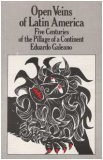

In her Foreword to Open Veins, the novelist Isabelle Allende said that Galeano ‘denounced exploitation with uncompromising ferocity’ and following the book’s publication, it was banned by military governments in Chile, Argentina and Uruguay.

Universally recognized as one of the most important writers of our time, Allende once again contributes her talents to literature, to political principles, and to enlightenment. This classic is now further honored by Isabel Allende’s inspiring introduction. All readers interested in great historical, economic, political, and social writing will find a singular analytical achievement, and an overwhelming narrative that makes history speak, unforgettably. An immense gathering of materials is framed with a vigorous style that never falters in its command of themes. Weaving fact and imagery into a rich tapestry, Galeano fuses scientific analysis with the passions of a plundered and suffering people.


These are the veins which he traces through the body of the entire continent, up to the Rio Grande and throughout the Caribbean, and all the way to their open ends where they empty into the coffers of wealth in the United States and Europe. Thus he is concerned with gold and silver, cacao and cotton, rubber and coffee, fruit, hides and wool, petroleum, iron, nickel, manganese, copper, aluminum ore, nitrates, and tin. Rather than chronology, geography, or political successions, Eduardo Galeano has organized the various facets of Latin American history according to the patterns of five centuries of exploitation. It is also an outstanding political economy, a social and cultural narrative of the highest quality, and perhaps the finest description of primitive capital accumulation since Marx. debut a quarter-century ago, this brilliant text has set a new standard for historical scholarship of Latin America. Tracing five centuries of exploitation in Latin America, a classic in the field, now in its twenty fifth year


 0 kommentar(er)
0 kommentar(er)
